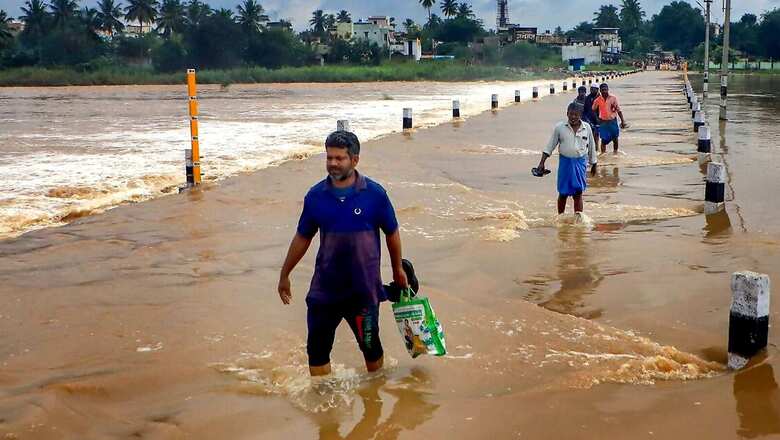
views
Farmers are now on the suffering edge of losing an entire crop due to incessant rains in Karnataka. The rainy season which has long extended into winter this year is a situation to which the farmers were unprepared. The Kharif crop is the worst affected though the harvesting hasn’t even begun and the crops are full and ready. Paddy is sprouting in the plant and coffee berries are dropping on the ground. More than harvesting, it is about drying and storing the crop. Since that can’t happen in the current cloudy-rainy weather, hundreds of hectares of land have been left without harvest.
Around 78.7 lakh hectares have been sown this Kharif season in Karnataka, out of which 10.2 lakh hectares are paddy alone. Accordingly, 138 tonnes of the crop is expected against the target of 135.5 tonnes. Thanks to a good amount of rainfall, farmers were happy and waiting for the bumper crop. But it is rain again that is playing spoilsport.
“I have sown ragi and paddy in my entire farm this season. The crop has come out really well. It is ready to be harvested, but rain isn’t allowing me to do it. The grains are in the plant and now they have started sprouting. Once the grain sprouts, it is a complete waste. It can’t even be fed to cattle. I have taken a loan this season. I was happy looking at the way the crops came out, expecting to clear off all debts and save some more. Now that is definitely not going to happen with these conditions. I am literally clueless about the future” said a very worried Manjappa Gowda to News18. He is a farmer in Shikaripura, Shimoga District.
It’s the fungus that is scary, explains Prof M B Raajegowda, Agrometeorology scientist and former Registrar of GKVK. “Due to waterlogging on grains, fungi will grow easily. This is a huge loss since the grains are completely useless thereafter. Earlier, in traditional methods of harvesting grains would be separated from the stalks in two levels and each part of it was used by farmers. Now, the situation is such that one can’t even have the courage to attempt harvest given the climatic conditions.”
The current climatic changes have become very unpredictable, he further explains. In October, during the withdrawal of monsoon, a certain system set in where southwestern monsoon and northeast monsoon both existed together for weeks. This was due to the delay in the southwest monsoon retreating. That was for the heavy rains to say. But now, it is all the game of clouds. Huge patches of clouds are forming in the Bay of Bengal every few hours. These clouds carry large quantities of moisture and move towards the Arabian Sea which has a low pressure now. The area on the way of cloud travel is now hit hard. Due to high moisture content, they precipitate resulting in rainfall. It is completely out of calculation as to when these will stop. The movement of the earth is equally contributing to the mobility of the clouds.”
Along with paddy and food crops, coffee is said to be the most affected commercial crop this season. Several planters in Chikkamagalur, Madikeri, Sakleshpur and surrounding areas are as helpless. The berries are dropping from the plants and rains are stopping them from harvest. The sun drying is also stopped due to cloudy-moist weather.
“Last year due to the Covid, the coffee market was nowhere to be seen. We thought at least this year, we will have a good income since the yield was good. But, it’s all rotting right before my eyes and I can’t do anything. They said Indian coffee will have high demand and higher prices this year because there was frost in Brazil, the largest coffee producer. But if rains curse us like this, what can we do?” asks a helpless Fernandes, coffee planter at Sakleshpur.
What is the solution for all of this? Is there any solution at all?
“Change the crop,” says Prof M B Rajegowda. “The agricultural institutions should work with farmers at ground level in these times and help them with the technical knowhow. Encourage the farmers to sow early and use short-term crops. This may reduce the overall profit, but the loss is very minimal. It is better to have a crop rather than not having any. Let them cultivate a variety that is ready for harvest in half the time. Advanced transplantation helps many for sure” he explains.
Overall, around 25% of paddy and 30% of coffee crops are said to be lost in Karnataka alone. But the government hasn’t done any survey on this yet which is certainly the need of the hour.
Read all the Latest India News here



















Comments
0 comment